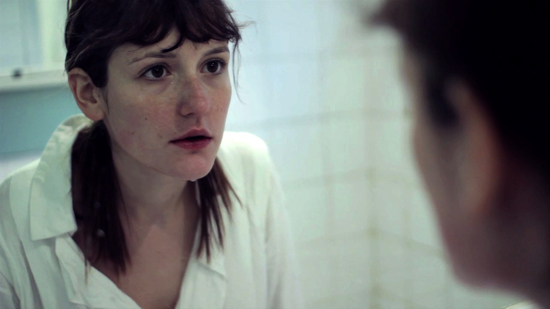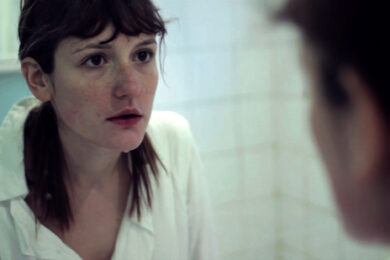With the London Film Festival just finished, it might seem time to roll away the red carpet and settle down to a diet of X-Factor and I’m a Celebrity, but there is another festival on the horizon, offering a plethora of bite-sized filmic delights.
Focusing on the talents of women behind the camera, UndeWire opens in London tonight – Wednesday 23rd November – with the first of its programmes, The XX Award, recognising filmmakers of any gender for well-rounded portrayals of female characters. Other categories are focused on female practitioners, including editing, cinematography, and production, while two new areas this year are film journalism and composition.
With Birds Eye View not running next year and a bleak funding landscape facing filmmakers of all genders, it may not seem a particularly inspiring time to make shorts, but UnderWire co-director Helen Jack feels that the time is right for this “industry-facing festival”, now in its second year, to set out its stall. Speaking via Skype from her hotel in Bristol, where she was attending the Encounters Festival, she explained to Val Phoenix the backdrop to the festival and the politics that underpins it.
So, you’re at Encounters. Are you checking out the competition?
Helen Jack: I’m actually here because of my day job, which is running Shooting People. So, that’s why I’m here, but, I’m also doubling up as an UnderWire representative and giving out all our flyers and seeing who’s around.
When you go to festivals, do you keep an eye out, in terms of representation of women?
HJ: Personally, I do, but [festival co-founder] Gemma [Mitchell] set up UnderWire with another woman, Gabriella [Apicella], last year. And I came on board as of July, so this is my first year being co-director of UnderWire. So, I haven’t as yet been round festivals looking for work. But, I’ve been interested in women and film for quite a long time.
But, in your work through Shooting People have you noticed a disparity in women making films?
HJ: Yeah, interestingly, short film does tend to have more women directors, at least, because I think it’s a more open platform. I still feel like there’s a gap. I was flicking through the shorts programme at Encounters, some of the British programmes, and there’ll be like one woman and nine men. So, there’s definitely a gap there.
How would you assess the state of the industry? It’s at an interesting point.
HJ: That’s quite a big question. Well, obviously, Birds Eye View is not happening next year, which is really sad. But, I don’t necessarily think that they’ve been targeted because they’re a women’s film festival. I think there are other things in play there. It’s interesting, because the three big British films at London Film Festival this year were Shame, which is [directed by] a black guy [Steve McQueen], [Wuthering Heights, directed by] Andrea Arnold and [We Need to Talk About Kevin, directed by] Lynne Ramsay. So, it wasn’t white male-dominated. Particularly, for British film, I think there are some really interesting women filmmakers out there, particularly in documentary. You’ve got Kim Longinotto and Lucy Walker, who’s based in the States now. I kind of feel quite positive about the increase in women making films and making good films that will, hopefully, lead to them having a sustainable career.
What kind of role do you see UnderWire playing? Is it a showcase for up-and-coming filmmakers? Is it getting a foothold for itself to be an industry player? How do you see it functioning?
HJ: We kind of see ourselves as industry-facing, because one of the aims of UnderWire is to encourage new talent, even though there are no age restrictions or you can have made as many films as you like. And we focus only on British filmmakers – or someone who’s lived abroad, but if the production’s British, that still counts. And we’re not a director-centric festival, so we have different categories for women who are film composers, or editors or producers. So, I kind of feel like we have cornered a market that hasn’t already been looked at.
The reason we have the industry sessions is that we kind of want to, on a grassroots level, encourage women working in film across all the crafts to meet up. I was talking to a filmmaker the other night who screened her work at UnderWire last year, and she said it gave her a huge confidence boost, because, until then, she’d been a focus puller and she didn’t feel like she was a fully-fledged cinematographer herself. It kind of does make a difference to see other women making films. It shows you that it can be done. It was great to hear her talk about the people she’s worked with since screening at UnderWire last year, and her work is in the cinematography category for UnderWire this year.
Are you seeing any trends in subject matter?
HJ: In terms of theme, when I programme for other festivals, you do notice repetitive themes. I didn’t notice it so much with this programme. It was quite a mixed bag. There were a few films about female sexuality. I don’t know whether women filmmakers feel their history of female sexuality hasn’t been seen so much on screen. I did notice quite a lot of adolescent fantasy, hormone-driven films, which is quite interesting. What was kind of great about these films, and why I think a festival like Underwire does need to exist, is we definitely saw some really interesting female characters. Our opening night programme, The XX Award, is actually open to men and women [filmmakers]. It’s great to see these characters that are not just the bog standard love interest.
Do you feel the festival maintains a politicised outlook?
HJ: Absolutely. Two of my biggest interests are feminism and film. I do feel like there’s an increase of interest in feminism at the moment, and I kind of feel that this is us doing our part. Some of the industry events that we’re doing are kind of quite political: women and performance art and the representation of women in music videos. Some festivals kind of shy away from dealing with feminism, because they want to be mainstream. We’d love to be accepted in the mainstream, as long as people are willing to kind of take on the fact that this is a political festival, as much as it is an industry one, and we kind of hope that people do engage with those issues. The XX Award is sponsored by Object, an activist group that campaigns against the sexual objectification of women.
What do you want to get out of this year’s festival?
HJ: I’m interested in meeting the women involved in these projects. One of my favourite things to do is to go to debates and lectures and hear about what people have to say about things that I am interested in. And so, I think the industry sessions are going to be really fascinating. I want people to come down and meet and engage and talk about it, and they don’t just come and watch some films and walk away. I’m hoping people will recognise that there are a lot of female voices that aren’t heard.
UnderWire runs November 23-26 in Bermondsey. Check the festival website for more information.



